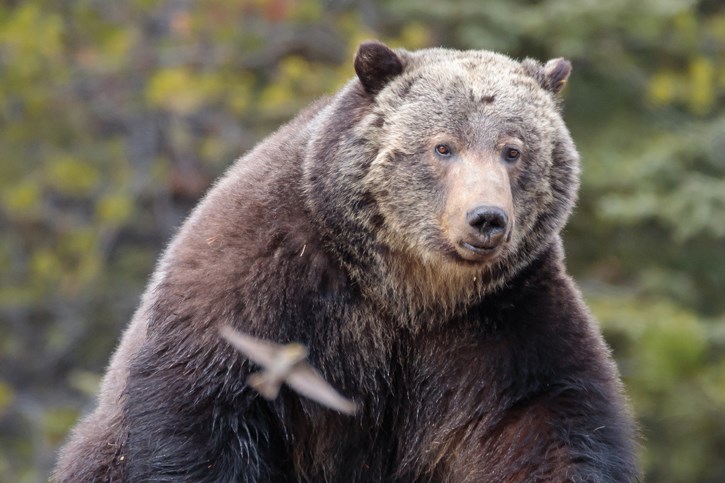LAKE LOUISE, Alta – A rare white grizzly bear has been relocated away from the deadly Trans-Canada Highway in an attempt to save her life.
While Parks Canada does not typically intervene, wildlife staff captured and fitted a GPS collar on the well-known white grizzly bear on June 21.
Parks Canada officials say the female bear, believed to be about five years old, was released in an area within her home range, but away from the Trans-Canada Highway and Canadian Pacific Railway line.
“These actions were the result of the bear’s persistence in climbing the highway fencing and seeking out forage, such as dandelions, on the wrong side of the highway fencing,” said James Eastham, a spokesperson for Lake Louise, Yoho and Kootenay field units in an email.
Bear experts have said the white bear is not albino – mutations of certain genes that affect the amount of melanin, which controls the pigmentation of skin, eyes and hair. It is likely that the rare colour is caused by a recessive gene that makes fur white.
The GPS collar will remain on the bear for up to three years, before being remotely released.
As a backup to the timed drop-off mechanisms, the collar includes a section designed to decompose over time, causing the collar to fall off.
The GPS collar will be used to track the white bear and allows wildlife staff to better anticipate when she will appear alongside the roadway.
“Parks Canada staff have been working hard to protect the white bear and will continue to encourage it to use safer habitat away from roads and community of Lake Louise,” Eastham said.
The Trans-Canada Highway has taken a deadly toll on grizzly bears in Yoho National Park this spring.
A female grizzly – the sibling of the white grizzly – was struck and killed on the highway near the Lake O’Hara turnoff on June 7.
Four days later, a male grizzly bear was also killed along the same stretch. This bear was previously unknown to Parks Canada, but had been seen in the company of the white bear and her sibling earlier this spring at the start of the breeding season.
Eastham said Parks Canada team members work hard to reduce human-caused wildlife mortality, but noted keeping wildlife wild is a shared responsibility.
He noted the importance of observing reduced speed limits, driving with caution in the early morning and evening hours and not stopping if wildlife are roadside, particularly along the Trans-Canada Highway.
“We all have a role to play,” Eastham said.
John Marriott, a local wildlife photographer and conservationist, said he believes that without collaring her and moving this bear, she was going to get hit on the highway sooner than later.
"I’m not always in favour of collaring bears, but in this case, I think Parks has made a move they had to make," he said.
"There really aren’t a lot of options left to keep her alive and she’s such a critical bear in the Lake Louise area because she’s just reaching sexual maturity and is one of the last females left in the area that I think they absolutely had to take action and collar and relocate her," he added.
"What’s happened with female mortalities in the area in the past year, Parks can’t afford to lose this bear."
Meanwhile, male grizzly bear 136, also known as Split Lip for his disfigured mouth, is believed to have killed two young-of-the-year cubs last week.
Earlier this spring, a well-known 12-year-old female grizzly bear 142 emerged from den with three cubs in tow.
Eastham said bear 136 was seen chasing the cubs near Lake Louise on the night of June 22.
“In subsequent days F142 has been seen with only one cub,” he said.
“It is suspected the other cubs may have been killed by M136.”
Split Lip has hunted and killed other cubs belonging to bear 142 in the past.
In 2020, he killed a two-and-a-half-year-old cub near Morant’s Curve along the Bow Valley Parkway, forcing the closure of the area for public safety reasons and to give him security to feed.
Male grizzly bears are known to prey upon other bears, including bear cubs.
“While we regret the loss of any bear on the landscape, this is a natural occurrence and not uncommon behaviour,” Eastham said.
All residents and visitors are asked to report wildlife incidents to Parks Canada dispatch at 403-762-1470.
Grizzly bears are listed as threatened in Alberta and ranked as S3 (Vulnerable Uncertain) in B.C.



